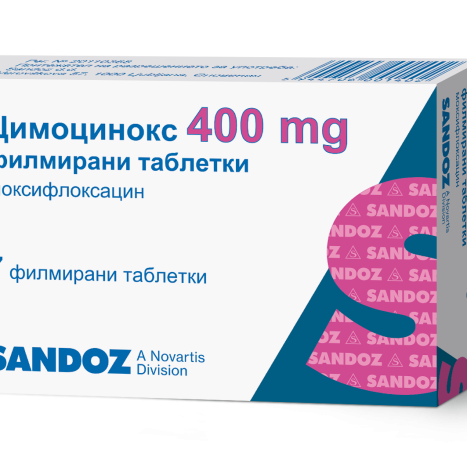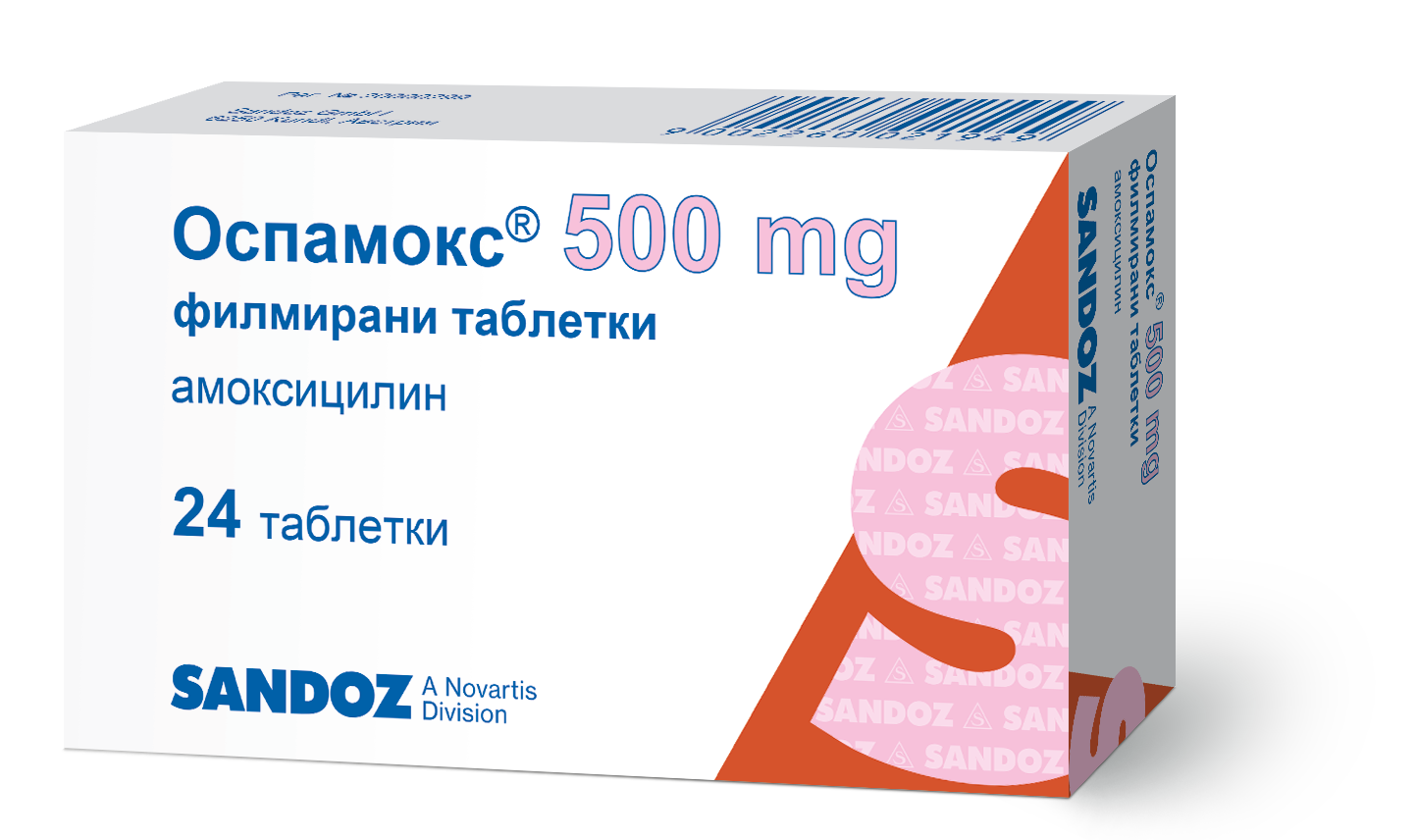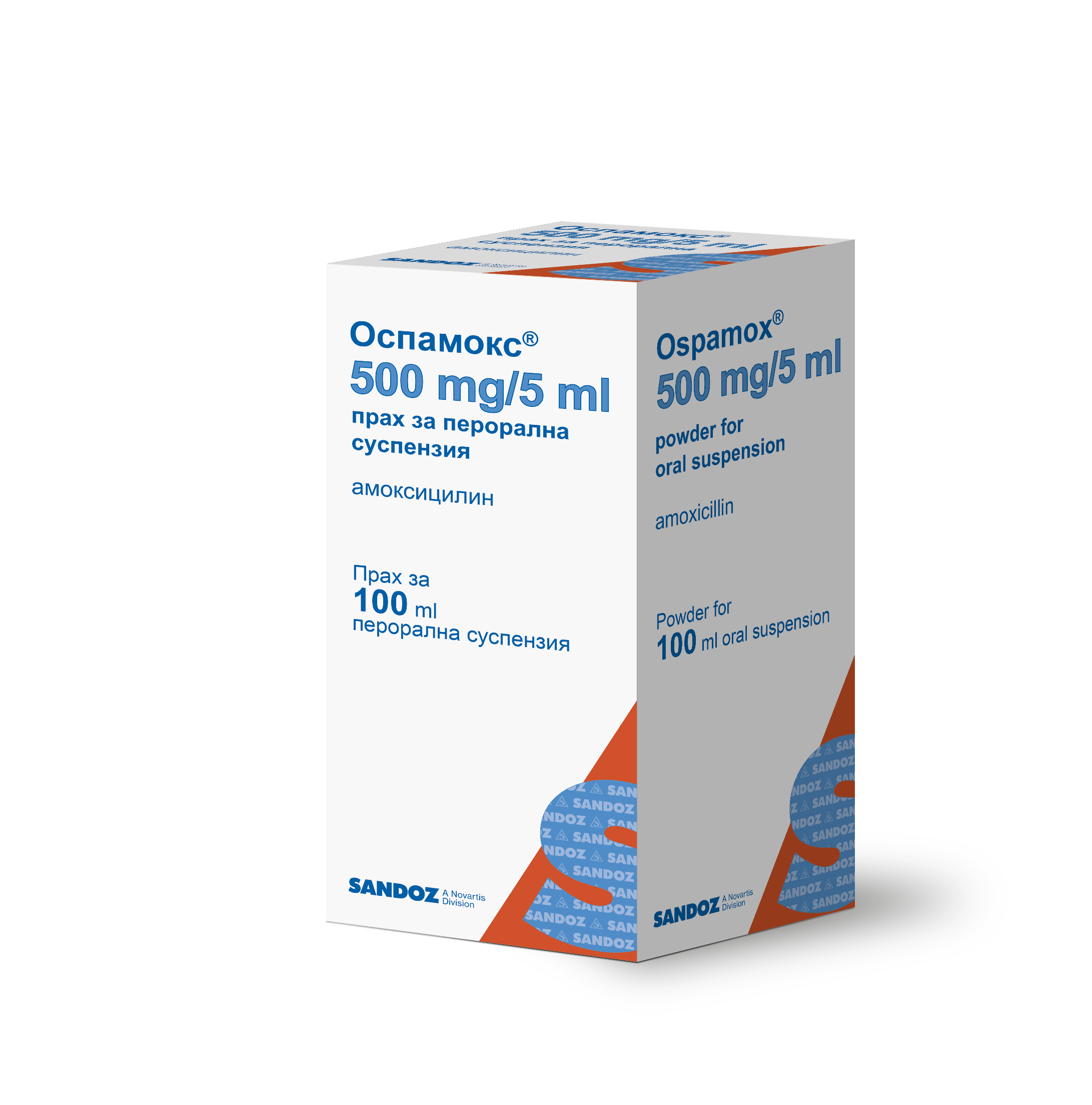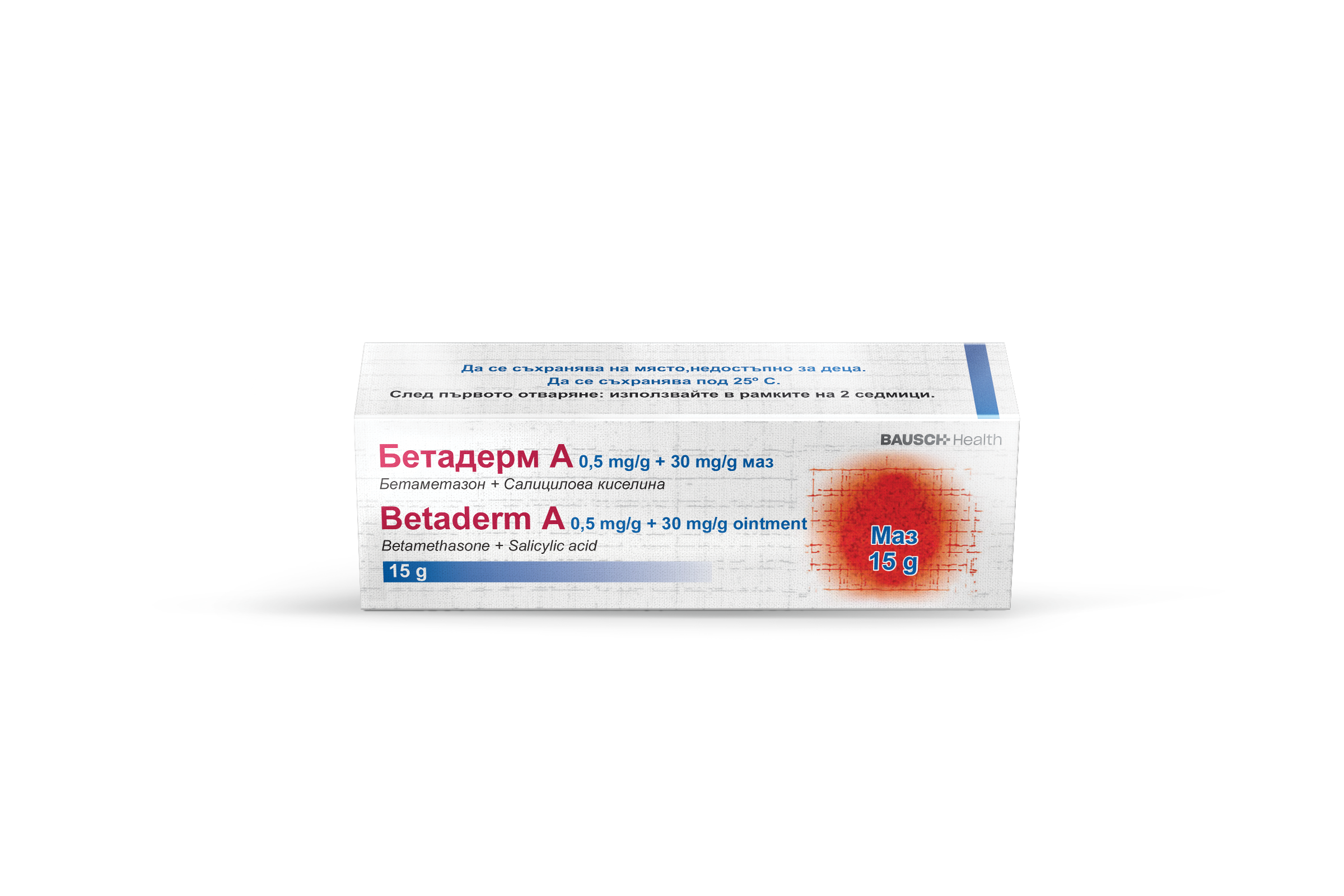CIMOCINOX 400mg x 7 tabl
Leaflet: patient information
Cymocinox 400 mg film-coated tablets
Cimocinox 400 mg film-coated tablets
moxifloxacin (moxifloxacin )
Read all of this leaflet carefully before you start taking this medicine because it contains important information for you
- Keep this leaflet. You may need to read it again.
- If you have any further questions, ask your doctor or pharmacist.
- This medicine has been prescribed for you personally. Don't leave it to other people. It can harm them, regardless of the fact that the signs of their illness are the same as yours.
- If you get any of the side effects, tell your doctor or pharmacist. This also includes any possible side effects not described in this leaflet. See point 4.
What this leaflet contains :
1. What Cymocinox is and what it is used for
2. What you need to know before you take Cymocinox
3. How to take Cymocinox
4. Possible side effects
5. How to store Cymocinox
6. Contents of the package and additional information
1. What Cymocinox is and what it is used for
Cymocinox contains the active substance moxifloxacin, which belongs to a group of antibiotics called fluoroquinolones. Cymocinox works by killing the bacteria that are causing the infection.
Cymocinox is used in patients 18 years of age and older to treat the following bacterial infections caused by bacteria against which moxifloxacin is active. Cymocinox should only be used when standard antibiotics cannot be used or do not work:
A sinus infection, a sudden worsening of a long-standing inflammation of the airways, or an infection of the lungs (pneumonia) acquired outside hospital (except in severe cases).
Mild to moderate infections of the female upper genital organs (pelvic inflammatory disease), incl. fallopian tube infections and uterine lining infections.
Cymocinox tablets are not sufficient when used alone to treat this type of infection. Therefore, for the treatment of the female upper genital organs, your doctor will additionally prescribe another antibiotic besides Tsimocinox (see point 2 What you should know before taking Tsimocinox, Warnings and precautions, Consult your doctor before taking Tsimocinox).
If the following bacterial infections have shown improvement during the initial treatment with moxifloxacin infusion solution, Cymocinox 400 mg film-coated tablets may also be prescribed by your doctor to complete the course of treatment:
- lung infection (pneumonia) acquired outside hospital
- skin and soft tissue infections
Cymocinox 400 mg film-coated tablets should not be used to initiate therapy for any type of skin and soft tissue infection or for severe lung infections.
2. What you need to know before you take Cymocinox
Contact your doctor if you are not sure whether you belong to the patient groups described below.
Do not take Cymocinox
- if you are allergic to the active substance moxifloxacin, any other quinolone antibiotic or any of the other ingredients of this medicine (listed in section 6)
- if you are pregnant or breastfeeding
- if you are under 18 years of age
- if you have had a disease or tendon damage in the past associated with treatment with quinolone antibiotics (see section Warnings and precautions and section 4. Possible side effects)
- If you are born with, currently have, or have had:
- condition of irregular heart rhythm (detected by ECG, electrical recording of the heart)
- an imbalance of salts in the blood (especially low levels of potassium or magnesium)
- very slow heart rate (which is called 'bradycardia')
- weak heart (heart failure)
- a history of irregular heart rhythms
or
- if you are taking other medicines that can lead to changes in the ECG (see section Other medicines and Tsimocinox). This is necessary because Cymocinox can cause ECG changes known as 'QT prolongation', i.e. delayed conduction of the heart's electrical impulses
- If you have severe liver disease or elevated levels of liver enzymes (transaminases) more than 5 times the upper limit of normal
Warnings and precautions
Before taking this medicine
You should not take antibacterial medicines containing fluoroquinolones/quinolones, including Cymocinox, if you have had any serious side effects in the past when you took quinolones or fluoroquinolones. In this case, you should inform your doctor as soon as possible.
Talk to your doctor before taking Cymocinox.
- Cymocinox may change the ECG of your heart , especially if you are a woman or if you are elderly. If you are currently using any medicine that lowers the potassium levels in your blood, you should consult your doctor before taking Cymocinox (see also Do not take Other medicines and Cymocinox).
- If you suffer from epilepsy or a condition that makes you prone to seizures, you should consult your doctor before taking Cymocinox.
- Or if you have had any mental problems, you should consult your doctor before taking Cymocinox.
- If you suffer from myasthenia gravis (abnormal muscle fatigue that leads to weakness and, in severe cases, paralysis), taking Cymocinox may worsen the symptoms of your disease. If you think this may apply to you, consult your doctor immediately.
- If you have been diagnosed with an enlargement or "ballooning" of a large blood vessel (aortic or large peripheral blood vessel aneurysm).
- If you have had a previous case of aortic dissection (tear in the wall of the aorta).
- If you have been diagnosed with prolapsed heart valves (regurgitation of the heart valves).
- If you have a family history of aortic aneurysm or aortic dissection, or congenital heart valve disease, or other risk or predisposing factors (eg, connective tissue disorders such as Marfan syndrome or vascular Ehlers-Danlos syndrome, Turner's syndrome, Sjogren's syndrome [an inflammatory autoimmune disease] or vascular disorders such as Takayasu's arteritis, giant cell arteritis, Behçet's disease, high blood pressure or known atherosclerosis, rheumatoid arthritis [joint disease] or endocarditis [inflammation of the lining of the the heart]).
- If you or a member of your family has a deficiency of the enzyme glucose-6-phosphate dehydrogenase (a rare hereditary disease), tell your doctor, who will assess whether Cymocinox is suitable for you.
- If you have a complicated infection of the upper parts of the female reproductive system (eg associated with an abscess of the fallopian tubes, ovaries or pelvis) for which your doctor may judge that intravenous treatment is necessary, treatment with Cymocinox Tablets is not suitable.
- For the treatment of mild to moderate infections of the upper parts of the female reproductive system, your doctor should prescribe another antibiotic in addition to Cymocinox. If you have no improvement in symptoms after the 3rd day of treatment, please consult your doctor.
- If you are diabetic, as there may be a risk of changes in your blood sugar levels with moxifloxacin treatment
- If you have ever developed a severe skin rash or skin peeling, blisters and/or mouth sores after taking moxifloxacin.
When taking Cymocinox
- If you experience palpitations (skipping of the heart) or an irregular heartbeat during treatment, you should inform your doctor immediately. He may need to do an EKG to check your heart rhythm.
- The risk of heart problems may increase as the dose increases. Therefore, the recommended dose should be followed.
- There is a small chance that you will develop a severe, sudden allergic reaction (anaphylactic reaction/shock) even with the first dose. Symptoms include chest tightness, dizziness, nausea or lightheadedness, and lightheadedness when standing up. If this happens, stop taking Cymocinox and seek medical attention immediately.
- Cymocinox can cause rapid and severe inflammation of the liver , which can lead to life-threatening liver failure (including fatal outcome, see section 4. Possible side effects). If you suddenly feel sick and/or feel sick, the whites of your eyes turn yellow, your urine is dark, you have itchy skin, an increased tendency to bleed, or you show brain damage, due to a liver disorder (symptoms of depressed liver function or sudden and severe inflammation of the liver), please contact your doctor before taking your next doses.
- Serious skin reactions including Stevens-Johnson syndrome, toxic epidermal necrolysis, and acute generalized exanthematous pustulosis have been reported with moxifloxacin.
• Stevens-Johnson syndrome/toxic epidermal necrolysis may present initially as reddish target-like patches or circular patches, often with central blisters, on the torso. Ulcers in the mouth, throat, nose, genitals and eyes (red and swollen eyes) may also occur. These serious skin rashes are often preceded by fever and/or flu-like symptoms. Rashes can progress to widespread skin peeling and life-threatening complications or be fatal.
• Acute generalized exanthematous pustulosis manifests early in treatment as a red, scaly, widespread rash with subcutaneous swelling and blisters, accompanied by fever. It most often develops on the skin folds, torso and upper limbs.
If you develop a serious rash or any of these skin symptoms, stop using moxifloxacin and contact your doctor or get medical help right away.
- Antibiotics from the quinolone group, including Cymocinox, can cause seizures . If this happens, stop taking Cymocinox and contact your doctor immediately.
- Rarely, you may experience symptoms of nerve damage (neuropathy), such as pain, burning, tingling, numbness and/or weakness, especially in the feet and legs or hands and arms. If this happens, stop taking Cymocinox and tell your doctor immediately to prevent the development of a potentially irreversible condition.
- It is possible to experience mental problems even when taking quinolone antibiotics such as Cymocinox for the first time. In very rare cases, depression or mental disorders have led to suicidal thoughts and self-harming behavior such as suicide attempts (see section 4. Possible side effects). If you develop such reactions, stop taking Cymocinox and inform your doctor immediately.
- Diarrhea may occur during or after treatment with antibiotics, including Cymocinox. If it is severe or prolonged, or if you notice that your stool contains blood or mucus, you should stop taking Cymocinox and consult your doctor immediately . You should not take medicinal products to suppress or slow down bowel movements.
- Rarely, pain and swelling in the joints and inflammation or tearing of the tendons may occur. Your risk is increased if you are elderly (over 60 years of age), if you have had an organ transplant, have kidney problems or if you are being treated with corticosteroids. Tendon inflammation and tears may occur within the first 48 hours of treatment and even up to several months after discontinuation of Cymocinox therapy. At the first sign of pain or inflammation of a tendon (eg in the ankle, wrist, elbow, shoulder or knee), stop taking Cymocinox, contact your doctor and rest the painful area. Avoid unnecessary strain, as this can increase the risk of tendon rupture.
- If you experience sudden, severe pain in your abdomen, chest, or back , which may be symptoms of an aortic aneurysm and dissection, go to the emergency room right away. The risk may be increased if you are treated with systemic corticosteroids.
- If you suddenly become short of breath, especially when lying on your back in bed, or notice swelling of your ankles, feet or abdomen, or develop palpitations (a feeling of a fast or irregular heartbeat), you should tell a doctor immediately.
- If you are elderly and have kidney disorders , you should make sure you drink enough water during treatment with Cymocinox. If you become dehydrated, this can increase your risk of kidney failure.
- If your vision is affected or if you think your eyes are damaged while taking Cymocinox, consult an eye doctor immediately (see sections Driving and using machines and 4. Possible side effects).
- Fluoroquinolone antibiotics can cause blood sugar levels to rise above normal levels (hyperglycaemia) or blood sugar levels to fall below normal levels (hypoglycaemia), potentially leading to loss of consciousness (hypoglycaemic coma) in severe cases (see section 4. Possible side effects) . If you suffer from diabetes, your blood sugar should be monitored carefully.
- Quinolones can make your skin more sensitive to sunlight or UV rays. You should avoid prolonged exposure to strong sunlight and should not use tanning beds or other UV rays while taking Cymocinox.
- The effectiveness of moxifloxacin solution for infusion in the treatment of severe burns, connective tissue infections and diabetic foot infections with osteomyelitis (infection of the bone marrow) has not been established.
Antibiotics from the quinolone group can cause blood sugar levels to rise above normal values (hyperglycaemia) or blood sugar levels to fall below normal values, which can lead to loss of consciousness (hypoglycaemic coma) in severe cases (see .4). This is important for people with diabetes. If you suffer from diabetes, you should carefully monitor your blood sugar levels.
Prolonged, debilitating and potentially irreversible serious side effects
The use of antibacterial drugs containing fluoroquinolones/quinolones, including Cymocinox, is associated with the occurrence of very rare but serious side effects, some of which are long-lasting (months or years), debilitating or potentially irreversible. This includes pain in the tendons, muscles and joints of the upper and lower limbs, difficulty walking, unusual sensations such as pricking, tingling, tickling, numbness or burning sensations (paresthesias), sensory disturbances including disturbances of sight, taste, smell and hearing , depression, memory impairment, severe fatigue and severe sleep disturbances.
If you experience any of these side effects after taking Cymocinox, contact your doctor immediately before continuing treatment. You and your doctor will decide whether to continue the treatment, also discussing the possible use of another class of antibiotic.
Children and adolescents
This medicine should not be used in children and adolescents under 18 years of age, as its efficacy and safety have not been established in this age group (see section "Do not take Cymocinox").
Other medicines and Cymocinox
Tell your doctor or pharmacist about all the medicines you are taking, have recently taken or might take.
When taking Cymocinox, keep the following in mind:
If you take Cymocinox and other drugs that affect the heart , there is an increased risk of heart rhythm changes. Therefore, do not take Cymocinox simultaneously with the following medicinal products:
- medicines from the group of anti-arrhythmic agents ( such as quinidine, hydroquinidine, disopyramide, amiodarone, sotalol, dofetilide, ibutilide)
- antipsychotics (such as phenothiazines, pimozide, sertindole, haloperidol, sultopride)
- tricyclic antidepressants
- certain antimicrobials ( such as saquinavir, sparfloxacin, intravenous erythromycin pentamidine, drugs used to treat malaria , and especially halofantrine)
- some antihistamines (terfenadine, astemizole, mizolastine)
- other medicines (eg cisapride, vincamine for injection into a vein, bepridil and diphemanil).
- You should tell your doctor if you are taking other medicines that can lower the potassium levels in your blood (such as some diuretics, some laxatives and enemas (high doses), corticosteroids (medicines to treat inflammation), amphotericin B or cause slow heart rhythm, because these medicines can also increase the risk of serious heart rhythm disorders while you are taking Cymocinox.
- Any medicine that contains magnesium or aluminum (such as antacids for indigestion), iron, zinc or didanosine , or any medicine that contains sucralfate (for the treatment of stomach disorders) may reduce the effect of Cymocinox tablets. Take Cymocinox 6 hours before or after these medicines.
- If at the same time as Tsimocinox you take a drug containing activated carbon - the action of Tsimocinox weakens. It is recommended that the two drugs not be used together.
- If you are currently taking blood thinners (oral anticoagulants such as warfarin). Your doctor may need to monitor the clotting time.
Cymocinox with food and drink
Cymocinox can be taken with or without food (including dairy products).
Pregnancy, lactation and fertility
Do not take Cymocinox if you are pregnant or breast-feeding.
If you are pregnant or breast-feeding, think you may be pregnant or are planning to become pregnant, ask your doctor or pharmacist for advice before using this medicine.
Animal studies have shown no evidence that fertility is affected by taking this medicine.
Driving and using machines
Cymocinox may make you feel dizzy or light-headed, you may experience a sudden, temporary loss of vision, you may lose consciousness for a short time. Do not drive or operate machinery if this happens to you.
This medicine contains less than 1 mmol sodium (23 mg) per dose unit, i.e. practically no sodium.
3. How to take Cymocinox
Always take this medicine exactly as your doctor or pharmacist has told you. If you are not sure about something, ask your doctor.
For adults, the recommended dose is one 400 mg tablet once daily.
Tsimocinox tablets are intended for oral use. Swallow the tablet whole (to avoid the bitter taste) with a sufficient amount of liquid. You can take Cymocinox with or without food. Try to take the tablet at the same time each day.
The same dose can be taken by elderly patients, patients with low body weight or patients with kidney problems.
The duration of treatment with Cymocinox depends on the infection. Unless otherwise recommended by your doctor, treatment is:
- sudden worsening (acute exacerbation) of chronic bronchitis: 5 - 10 days
- lung infections (pneumonia), except for pneumonia that started during a hospital stay of 10 days
- acute sinus infections (acute bacterial sinusitis) 7 days
- mild to moderate infections of the female upper genitals (pelvic inflammatory disease), including infections of the fallopian tubes and lining of the uterus 14 days
When Cimocinox 400 mg film-coated tablets is administered to complete a course of therapy started with moxifloxacin infusion solution, the recommended duration of administration is:
- lung infection (pneumonia) acquired outside hospital: 7-14 days
Most patients switch to oral therapy with moxifloxacin tablets within 4 days.
- skin and soft tissue infections: 7-21 days.
Most patients with skin and soft tissue infections transition to oral therapy with moxifloxacin tablets within 6 days.
It is important to complete the course of treatment even if you start to feel better after a few days. If you stop taking Cymocinox too soon, your infection may not be completely cured and may come back or your condition may get worse. The bacteria causing the infection may become resistant to Cymocinox.
The dose and duration of treatment should not be exceeded (see point 2. What you need to know before taking Tsimocinox, Warnings and precautions ).
If you have taken more Cymocinox than you should
If you have taken more than the prescribed one tablet per day, seek medical help immediately . Try to take the remaining tablets, the package or the leaflet with you to show the doctor or pharmacist what medicine you have taken.
If you forget to take Cymocinox
If you forget to take your tablet, take it as soon as you remember on the same day. If you do not remember on the same day, take the normal dose (one tablet) the next day. Do not take a double dose to make up for a missed dose.
If you are not sure what to do, ask your doctor or pharmacist.
If you have stopped taking Cymocinox
If you stop treatment prematurely, the infection may not be completely cured. Talk to your doctor if you want to stop taking the tablets before your course of treatment is finished.
If you have any further questions related to the use of this medicine, please ask your doctor or pharmacist.
4. Possible side effects
Like all medicines, this medicine can cause side effects, although not everybody gets them. The most serious side effects observed during treatment with Cymocinox are listed below:
If you notice
- abnormally fast heart rate (rare side effects)
- that you suddenly start to feel unwell or notice yellowing of the whites of the eyes, dark urine, itchy skin, a tendency to bleed or trouble thinking or being alert (these may be signs and symptoms of fulminant inflammation of the liver, potentially leading to life-threatening liver failure (as very rare side effects fatal cases have been observed)
- serious skin rashes, including Stevens-Johnson syndrome and toxic epidermal necrolysis. They can appear as reddish target-like spots or round spots, often with central blisters, on the torso, peeling skin, ulcers in the mouth, throat, nose, genitals, and eyes, and may be preceded by fever and flu-like symptoms (very rare side effects, potentially life-threatening)
- a red, scaly widespread rash with bumps under the skin and blisters, accompanied by fever at the start of treatment (acute generalized exanthematous pustulosis) (the frequency of this side effect is unknown)
- syndrome associated with impaired water excretion and low sodium levels (syndrome of inadequate antidiuretic hormone secretion) (very rare adverse reaction)
- loss of consciousness due to a severe drop in blood sugar levels (hypoglycaemic coma) (a very rare side effect)
- inflammation of the blood vessels (symptoms may be red spots on the skin, usually in the lower legs or joint pain) (a very rare side effect)
- severe, sudden generalized allergic reaction, incl. very rarely life-threatening shock (eg difficulty breathing, drop in blood pressure, rapid heart rate) (rare side effects)
- edema, incl. edema of the respiratory tract (rare side effects, potentially life-threatening)
- convulsions (rare side effects)
- problems related to the nervous system such as pain, burning, tingling, numbness and/or weakness in the limbs (rare side effects)
- depression (in very rare cases leading to self-harm such as suicidal thoughts/thoughts or suicide attempts) (rare side effects)
- fainting (potentially leading to self-harm such as suicidal thoughts/thoughts or suicide attempts) (very rare side effects)
- severe diarrhea with blood and/or mucus (antibiotic-associated colitis, including pseudomembranous colitis), which in very rare circumstances can develop into life-threatening complications (rare side effects)
- tendon pain and swelling (tendinitis) (rare side effects), or tendon rupture (very rare side effects)
- muscle weakness, tenderness or pain especially if at the same time you feel unwell, have a high temperature or dark urine. They may be caused by abnormal muscle breakdown, which can be life-threatening and lead to kidney problems (a condition called rhabdomyolysis) (the frequency of this side effect is unknown)
stop taking Cymocinox and tell your doctor immediately, as you may need emergency medical attention.
Also, if you notice
• transient loss of vision (very rare side effect), contact an eye doctor immediately.
If you have had a life-threatening irregular heartbeat ( Torsade de Pointes ) or cardiac arrest while taking Cymocinox (very rare side effects), tell your doctor immediately that you are taking Cymocinox and do not start treatment again.
In very rare cases, there is a worsening of the symptoms of myasthenia gravis. If this happens, consult your doctor immediately.
If you suffer from diabetes and notice that your blood sugar is increasing or decreasing (rare or very rare side effects), tell your doctor immediately.
If you are elderly with existing kidney problems and notice a decrease in urine output, swelling of the legs, ankles or feet, tiredness, nausea, sleepiness, shortness of breath or confusion (these may be signs and symptoms of kidney failure, a rare side effect ), consult your doctor immediately.
Other adverse drug reactions that have been observed during treatment with Cymocinox are listed below according to the likelihood of their occurrence:
Common, may affect up to 1 in 10 people
- infections caused by resistant bacteria or fungi, e.g. mouth infections or vaginal infections caused by Candida (thrush)
- headache
- dizziness
- nausea
- vomiting
- pain in the stomach and abdomen,
- change in heart rhythm (ECG) in patients with low blood potassium levels
- diarrhea
- increase in specific liver enzymes in the blood (transaminases)
Uncommon, may affect up to 1 in 100 people
• rash
• upset stomach (indigestion/acids in the stomach)
• changes in taste (in very rare cases loss of taste)
• sleep problems (mainly insomnia)
• increase in certain liver enzymes in the blood (gamma-glutamyl-transferase and/or alkaline phosphatase)
• reduced number of special white blood cells (leukocytes, neutrophils)
• constipation
• itching
• feeling dizzy (vertigo or sinking)
• drowsiness
• release of gases
• change in heart rhythm (ECG)
• impaired liver function (including elevation of certain liver enzymes in the blood (LDH))
• decreased appetite and food intake
• reduced number of white blood cells
• pains and complaints such as pain in the back, chest, pelvis and limbs
• increase in the number of special blood cells necessary for blood clotting
• sweating
• increased number of specialized white blood cells (eosinophils)
• anxiety
• general malaise (mainly weakness or tiredness)
• tremors
• joint pain
• palpitations
• non-rhythmic and accelerated heart activity
• difficulty breathing, incl. asthmatic conditions
• increase in certain digestive enzymes in the blood (amylase)
• anxiety/agitation
• tingling (pins and needles) and/or stiffness
• skin urticaria
• expansion of blood vessels
• confusion and disorientation
• decrease in the number of special blood cells necessary for blood clotting
• visual disturbances, incl. double and blurred vision
• delayed blood clotting
• increased blood lipids (fats)
• reduced number of red blood cells
• muscle pain
• alergic reaction
• increased bilirubin in the blood
• inflammation of the stomach
• dehydration
• severe heart rhythm disorders
• dry skin
• angina pectoris
Rare, may affect up to 1 in 1,000 people
- muscle spasms
- muscle cramps
- hallucinations
- high blood pressure
- swelling (of hands, feet, ankles, lips, mouth, throat)
- low blood pressure
- kidney damage (including increased values of special renal laboratory tests such as urea and creatinine)
- inflammation of the liver
- inflammation of the mouth
- ringing/tinnitus
- jaundice (yellowing of the whites of the eyes or skin)
- skin sensitivity disorder
- strange dreams
- impaired concentration
- difficulty swallowing
- changes in the sense of smell (including loss of smell)
- impaired balance and poor coordination (due to dizziness)
- partial or complete memory loss
- hearing impairment, including deafness (usually reversible)
- increased uric acid in the blood
- emotional instability
- impaired speech
- fainting
- muscle weakness
Very rare , may affect up to 1 in 10,000 people
- joint inflammation
- abnormal heart rhythm
- increased skin sensitivity
- feeling of separation from oneself (not being oneself)
- accelerated blood clotting
- muscle stiffness
- a significant decrease in special white blood cells (agranulocytosis)
- a strong decrease in the number of red and white blood cells and
platelets (pancytopenia)
Not known (frequency cannot be estimated from the available data)
- Loss of consciousness due to a severe drop in blood sugar (hypoglycaemic coma). See point 2.
In addition, the following side effects have been reported very rarely as a result of treatment with other quinolone antibiotics, which may also occur during treatment with Cymocinox:
- increased sodium levels in the blood
- increased levels of calcium in the blood
- a special type of reduction in the number of red blood cells (haemolytic anemia)
- increased sensitivity of the skin to sunlight or ultraviolet light.
Very rare cases of long-lasting (up to months or years) or permanent side effects such as tendonitis, tendon rupture, joint pain, limb pain, difficulty walking, unusual sensations such as pricking, tingling, tickling, burning sensation, numbness or pain (neuropathy), depression, fatigue, sleep disturbances, memory impairment, as well as impairment of hearing, sight, taste and smell, are associated with the administration of antibiotics containing quinolones and fluoroquinolones, in some cases regardless of pre-existing risk factors.
In patients taking fluoroquinolones, cases of widening and weakening of the aortic wall or the formation of a tear in the aortic wall (aneurysms and dissections) that can rupture and can be fatal, as well as cases of prolapse of the heart valves, have been reported. See also point 2.
Reporting adverse reactions
If you get any side effects, tell your doctor, pharmacist or nurse. This includes all possible side effects not described in this leaflet. You can also report adverse reactions directly through the national reporting system to the Executive Medicines Agency, 8 Damyan Gruev Street, 1303 Sofia, phone: +35928903417, website: www.bda.bg. By reporting side effects, you can contribute to getting more information about the safety of this medicine.
5. How to store Cymocinox
Keep out of the reach of children.
This medicinal product does not require special storage conditions.
HDPE bottles
Shelf life after opening: 1 year
Do not use this medicine after the expiry date which is stated on the carton, blister and HDPE bottle after EXP. The expiration date corresponds to the last day of the specified month.
Do not dispose of medicines down the drain or in the household waste container. Ask your pharmacist how to dispose of your unwanted medicines. These measures will help protect the environment.
6. Contents of the package and additional information
What Cymocinox contains
- The active substance is moxifloxacin.
Each film-coated tablet contains 400 mg of moxifloxacin (as hydrochloride).
- The other ingredients are: microcrystalline cellulose, corn starch, sodium starch glycolate (type A), silicon dioxide, colloidal anhydrous, magnesium stearate, hypromellose, microcrystalline cellulose, macrogol stearate (type I), titanium dioxide, iron oxide red, carminic acid .
What Cymocinox looks like and contents of the pack
Pink, oblong film-coated tablets debossed with "400" on one side.
Dimensions: approximately 17.6mm x 7.6mm
Types of packaging:
- Blisters containing 4, 5, 7, 10, 14, 20, 25, 50, 70, 80 and 100 film-coated tablets
- HDPE screw cap bottles containing 4, 5, 7, 10, 14, 25, 50, 70, 80 and 100 film-coated tablets
Not all types of packaging can be put on sale.
License holder
Sandoz dd
Verovškova 57, 1000 Ljubljana, Slovenia
Manufacturers
SC Sandoz SRL
Str. Livezeni nr. 7A, 540472 Targu-Mures, Romania
Salutas Pharma GmbH
Otto-von-Guericke-Allee 1, 39179 Barleben, Germany
LEK SA
Ul. Domaniewska 50 C, 02-672 Warszawa, Poland
Lek Pharmaceuticals dd
Verovškova 57, 1526 Ljubljana, Slovenia
Lek Pharmaceuticals dd
Trimlini 2 D, 9220 Lendava, Slovenia
This medicinal product is authorized for use in EEA member states under the following names:
Austria Moxifloxacin Sandoz 400 mg - Filmtabletten
Belgium MOXIFLOXACIN Sandoz 400 mg filmomhulde tabletten
Bulgaria Tsimocinox 400 mg film-coated tablets
Germany Moxifloxacin Sandoz 400 mg Filmtabletten
France Moxifloxacine Sandoz 400 mg, comprimé pelliculé
Poland Floxitrat
Spain Moxifloxacino Sandoz 400 mg comprimidos recubiertos con película EFG









